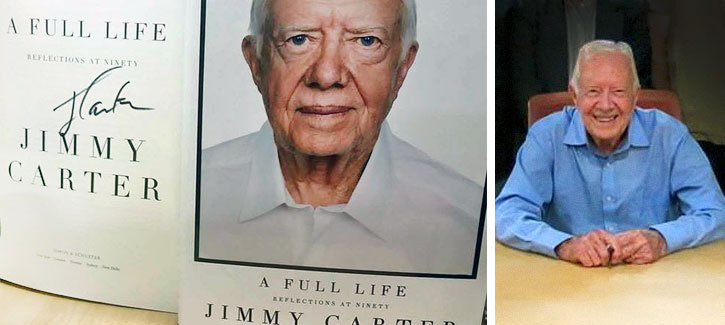
Signed Carter book. (Photos courtesy Seminary Co-Op)
Reflections at a book signing
Former president Jimmy Carter draws an admiring crowd of early risers at the Seminary Co-Op.
I’m pretty used to the Secret Service by this point; for the past year, my across-the-street neighbors have been the Obamas … even though they’re at home pretty infrequently compared to most of my other neighbors. So when I decide to go to former president Jimmy Carter’s book signing at the Seminary Co-Op for Carter’s new book A Full Life: Reflections at Ninety (Simon and Schuster), I imagine myself being nonchalant about the whole ordeal.
In the 272-page memoir, Carter discusses his youth growing up in rural Georgia, his presidency, his work with Habitat for Humanity, his Nobel Peace Prize, what he’s proud of, and what he might do differently. He also writes frankly about the current state of politics. The event where he’s to sign copies of the memoir, organized by the Seminary Co-Op and UChicago’s Institute of Politics, is a well-oiled machine.
Before Carter arrives, the line loops all the way around the store, weaving between shelves of books and guided by partitions set up around the store. As some wait in line, they browse. “I wish my spot in line was closer to the Psychology section,” says Megan Koehnen, a rising fourth-year biology and psychology major, while leafing through a musicology book. Megan has been here for almost three hours already, and it’s only 10:30 a.m.; the event isn’t supposed to start until noon. Her dad, she explains, told her when she was six that he loved Jimmy Carter, so she does too. “There are very few people I would wake up early and stand in line for,” she tells me, “and Jimmy Carter is one of them.” I ask her what she plans to say to Carter once she reaches the front of the line. After a long pause, she answers, “I don’t know. Thank you?”
The crowd at the event is massive and varied, even though Carter isn’t planning on speaking at length or reading aloud from his book. Sylvia Aschliman, AM’93, who secured a spot at the very front of the line by arriving at 7:30 a.m., says she’s long been planning to get a book signed for her father—she was going to surprise him with the gift the weekend after the book signing. Four days before the event, her father passed away, but Silvia is still here with his book, waiting to ask Carter to sign it.
Shari Valcourt, who’s also at the front of the line, says that Carter was the first person she ever got to vote for, in the 1980 election. Even though he didn’t win, Valcourt has a lot of respect for him, especially in his postpresidency life.
I ask everyone at the front of the line what they might say to Carter when he’s signing their books. “Thank you for speaking on human rights, especially for women” is what Maya Rodriguez, Class of 2018, thinks she might say. Others think they might tell him they voted for him or worry they might accidentally say “something super dorky,” but most plan on simply saying thanks.
Over by the press area, where several reporters and a big news camera are stationed, a group of elementary or middle school–aged reporters in matching turquoise T-shirts jump up and down with excitement.
Carter comes in fifteen minutes early, at 11:45 a.m., walking out with several members of what I assume to be the Secret Service. I’m starstruck. I knew this morning that I was going to a Jimmy Carter book signing, but actually being here, several feet away from someone who I mostly know about from AP US history class, is humbling and disorienting. Carter waves to the similarly dazed crowd, and then comes over to the press area. He shakes my hand. He notes that he doesn’t have a pen to sign books with. I offer him mine. He says, “That’s OK, thank you.” He reminds me of my grandpa.
President Carter has, at this point, only been in Chicago for two hours; he just came from Nashville. He tells us that he loves the city and that he always looks forward to the chance to visit, especially because he has dear friends who live in Evanston, Illinois. I, too, have dear friends who live in Evanston; how weird and normal.
Carter walks over to the table where he’ll be signing books—someone has found him a pen—and takes a seat. One of the young journalists steps up to get her book signed and asks him if he prefers thin crust or deep dish pizza. His answer: thin crust.
When I get my own book signed, I thank him. So does the person behind me in line, and so did the person in front of me in line. I can’t think of anything better to say, but “thank you” feels right.
